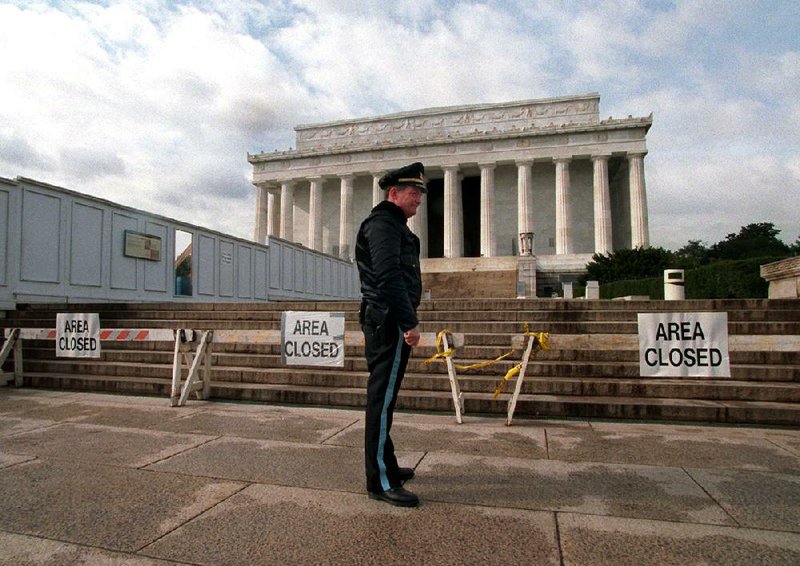Visa and passport applications from almost half a million prospective travelers would sit untouched every week, and late tax filers facing an Oct. 15 deadline would find the phone lines at the Internal Revenue Service dead. The National Zoo and museums on the Washington Mall would close to the public. The Women’s, Infants, and Children program, which provides food to 8.9 million low-income women and children, would be out of money, its supporters say.
RELATED ARTICLES
http://www.arkansas…">Senate OKs stopgap-spending billhttp://www.arkansas…">Cotton draws state Democratic flak for not being in D.C.
And in the District of Columbia, garbage could go uncollected.
This is, in part, what a government shutdown would look like. If Congress reaches Tuesday with no approved spending plan to keep the government open, many of the day-to-day services the public sometimes takes for granted would come to a standstill, as federal agencies send home more than 800,000 employees whose jobs are not considered essential.
Managers are kicking their preparations into high gear as the House gets ready to consider legislation approved by the Senate that keeps funding President Barack Obama’s health-care law attached to funding the government.
Agencies are declining to talk about contingency plans, which under law must lay out scenarios for an initial period of one to five days and a second stretch if a shutdown were to continue. But officials say privately that they are dusting off blueprints they drew up during another fiscal battle in 2011, which brought the government to the brink of closing.
In a shutdown, the government does not stop functioning completely. Activities considered essential to national security, public safety, health and welfare continue, and employees with jobs in those areas would be called to work.
So officers at the CIA, for example, would continue collecting intelligence. Federal prisons would be staffed, and other employees on the government’s front lines, such as meat and poultry inspectors, air traffic controllers, and airport baggage screeners, would stay on.
Social Security, Medicare and Medicaid, and unemployment insurance - benefits considered mandatory spending - would be paid. But new applicants might not have their applications processed until the government reopened.
That’s what happened in 1996, when thousands of retirees applying for Medicare were turned away. The staff that handled new Social Security enrollments and other services was furloughed at first, then called back to work when the White House realized that processing new claims was essential.
But with no one to staff many federal offices, the lights would go off in several of them - for example, at the State Department’s Bureau of Consular Affairs, which processes 252,000 passports and 172,000 visas a week on average.
“People traveling in October have heard the news there’s a government shutdown, and we’re getting a substantial number of calls,” said Walter Rasor, floor manager at the Florida-based RushMyPassport.com, a private firm that helps expedite 1,000 passports and 500 visas a week.
Rasor said he’s telling callers not to panic: They can get a passport this week, if they pay $299 to the company and an additional $170 to the State Department for expedited processing. “I tell them we could still get it in their hands by Monday,” he said.
The Bureau of Alcohol, Tobacco, Firearms and Explosives would not be able to issue permits to gun and explosives dealers. The government could stop insuring mortgages for first-time home buyers and issuing numerous loans to small businesses, because the employees processing them at Federal Housing Administration and the Small Business Administration would be off the job.
The country’s 401 national parks would close to the public, leaving only a crew of firefighters and law enforcement officers at work. The Environmental Protection Agency “effectively shuts down, with only a core group that are there in the event of an emergency,” Administrator Gina McCarthy told reporters at a breakfast this week.
The prospect is enraging many advocates for federal services.
“This is no way to manage the nation’s business or to care for the least among us,” said Douglas Greenaway, president of the National WIC Association, which advocates for the Special Supplemental Nutrition Program for Women, Infants and Children.
Women, Infants and Children centers get lines of credit every three months that they can draw down for food; the next is due Tuesday.
The National Parks Conservation Association has been getting calls all week from families who have booked vacations at national parks next week.
“You can imagine the number of people across the country who are disappointed,” said Theresa Pierno, the group’s acting director.
Much would depend on the length of a shutdown. Some government functions could continue for a few days but then be forced to close down. A spokesman for the federal courts said the system could keep operating for a short time using revenue from court fees and savings from previous budgets.Judges, as constitutional officers, must be paid no matter what. But when the fees and savings run out, it is unclear whether judges would preside over trials.
During the shutdowns of 1995 and 1996, work by Justice Department staff members on 3,500 bankruptcy cases was suspended.
There is also a healthcare law that was not on the books in 1995: the Affordable Care Act, the center of all the controversy in Congress over funding the government. Starting Tuesday, millions of Americans are scheduled to be able to sign up for new insurance plans.
White House officials said Wednesday that a shutdown would have no effect on the roll out, since much of it is either paid for or comes from a mandatory spending fund.
Front Section, Pages 7 on 09/28/2013

